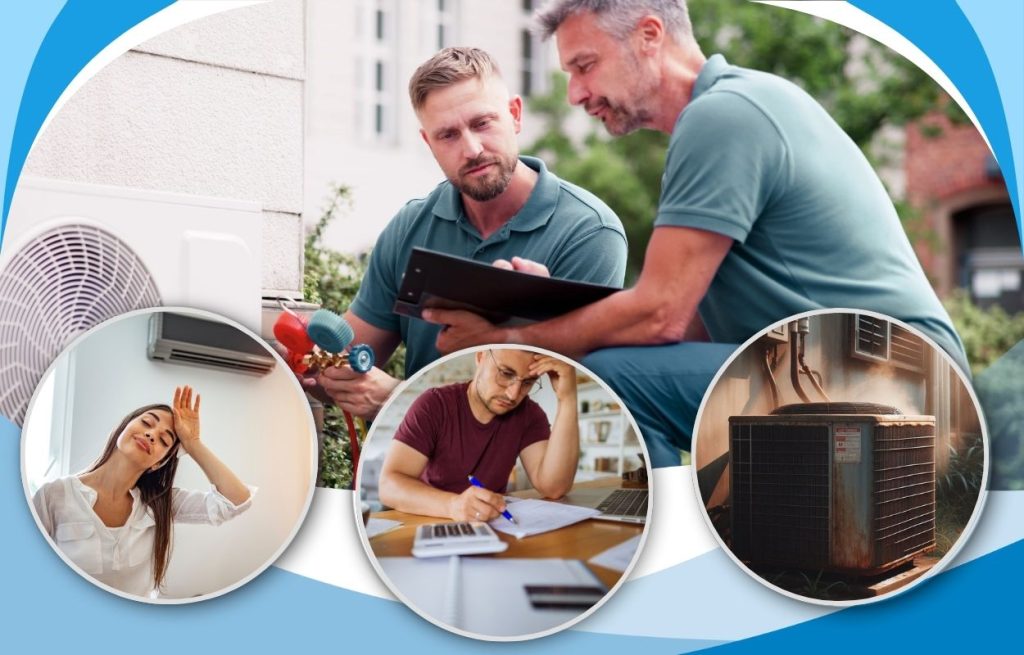
As warmer weather approaches, homeowners begin to prepare for summer: cleaning out closets, tuning up lawn equipment, and planning vacations. But one thing you don’t want to overlook is your air conditioning system. Before the summer heat arrives in full force, it’s essential to ensure your AC is in top working condition.
Ignoring the early signs of trouble can lead to uncomfortable days, costly emergency repairs, or even a total system failure right when you need cooling the most. Here are the most common signs your AC needs repair before summer hits, and what you can do to prevent mid-season cooling problems.

1. Poor Airflow: Causes and Repair Tips
If you’ve noticed that your AC doesn’t seem to be pushing out air as strongly as it used to, this is a major red flag. Weak airflow can indicate:
- A clogged or dirty air filter
- Ductwork issues or leaks
- A failing blower motor
Reduced airflow not only makes your system work harder but also makes it less effective at cooling your home. A professional tune-up or repair can identify and fix the problem before the heat sets in.
2. Warm Air from AC: Troubleshooting Guide
If your AC is running but the air coming from the vents is warm or only slightly cool, your system is not doing its job. This could be due to:
- Low refrigerant levels
- A malfunctioning compressor
- A thermostat issue
Scheduling an AC inspection before summer allows a technician to address these issues quickly—before your system is forced to run nonstop in extreme temperatures.
3. Identifying AC Noises That Indicate Repairs
Your air conditioner should run relatively quietly. If you begin to hear grinding, banging, squealing, or clicking sounds, it likely means something’s wrong. These noises may indicate:
- Loose or broken internal components
- A worn-out belt
- Motor problems
Addressing these sounds early can prevent larger mechanical failures down the road.
4. AC Problems That Cause High Energy Bills
A sudden spike in your energy bill especially before the summer cooling season begins can be a warning that your AC system is working inefficiently. The system may be running longer to maintain temperatures, using more energy in the process. Repairs or adjustments can restore efficiency and help you use your AC efficiently during peak season.
5. Outdoor AC Unit Problems and How to Fix Them
Take a look around your outdoor AC condenser unit. If you see ant mounds, weeds, or plants growing too close, this could interfere with airflow and cause your system to overheat. Pests like ants and spiders can even get inside the unit and damage internal components. It’s important to:
- Clear at least two feet of space around the unit
- Remove vegetation and debris
- Check for signs of animal or insect activity
Keeping your condenser clean and clear helps your AC run more efficiently and avoids avoidable repairs.
6. AC Short Cycling: Causes and Solutions
If your system turns on and off frequently (short cycling), or runs non-stop without reaching the desired temperature, it’s time to call a professional. These patterns put extra strain on your unit and can shorten its lifespan. Causes can range from a faulty thermostat to improper system sizing.
Why Scheduling AC Repairs Early Saves You Money
Spring is the perfect time to address any AC concerns—before the heat arrives and HVAC schedules fill up. Waiting until mid-summer to call for service can mean longer wait times and higher demand for emergency repairs. Proactive maintenance and timely repairs ensure your system will run reliably, efficiently, and comfortably all summer long. You can also follow these summer air conditioner tips to keep your system in top shape.
Frequently Asked Questions
Question: What are the early warning signs that my AC needs repair before summer arrives?
Answer: Look out for weak airflow, warm air from vents, strange noises like grinding or squealing, spiking energy bills, outdoor unit obstructions like plants or pests, and short cycling or running non-stop—these all suggest it’s time for a tune-up or repair.
Question: Why is poor airflow a problem?
Answer: Weak airflow often indicates issues like a dirty filter, leaky ductwork, or a failing blower motor—making your system less effective and less efficient.
Question: What issues can cause the AC to blow warm air?
Answer: Warm or only slightly cool air can mean low refrigerant, a malfunctioning compressor, or thermostat problems. Catching these early helps avoid overworking the system.
Question: How do unusual noises and rising energy bills point to repair needs?
Answer: Unusual sounds like clicking, squealing, or banging could signal loose or damaged components. A sudden uptick in energy bills usually means your system is running inefficiently.
Question: Why should I check around the outdoor AC unit before summer?
Answer: Ant hills, weeds, or debris around the condenser can obstruct airflow and cause overheating. Clearing at least two feet of space ensures better performance.
Contact Don’s AC Service, Inc. today to schedule an appointment for your HVAC and indoor air quality needs!
